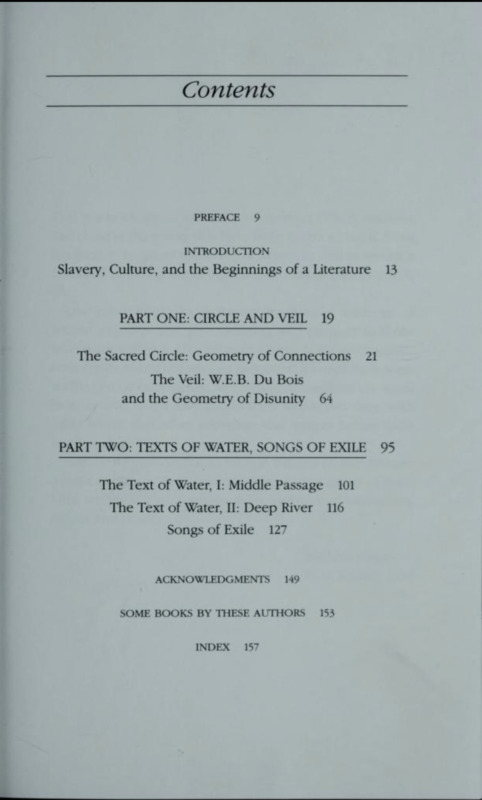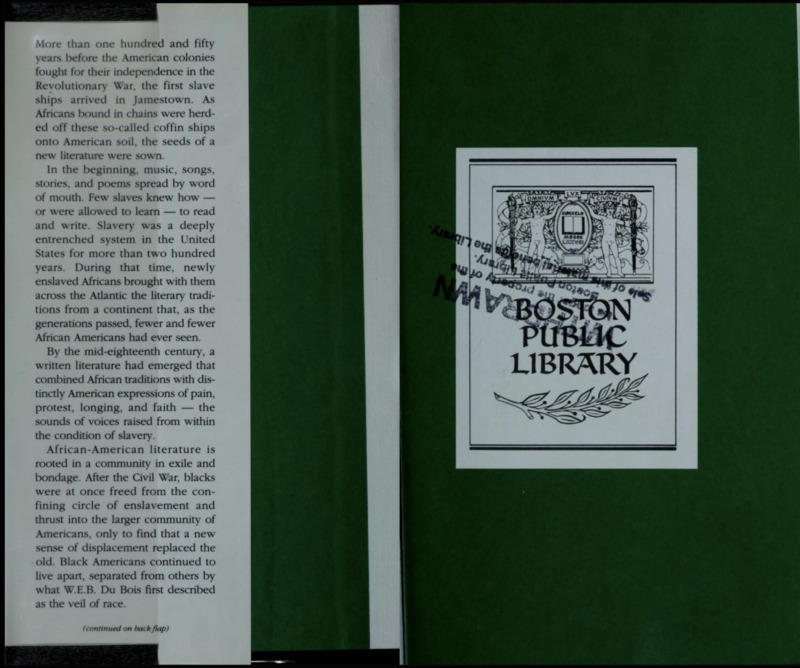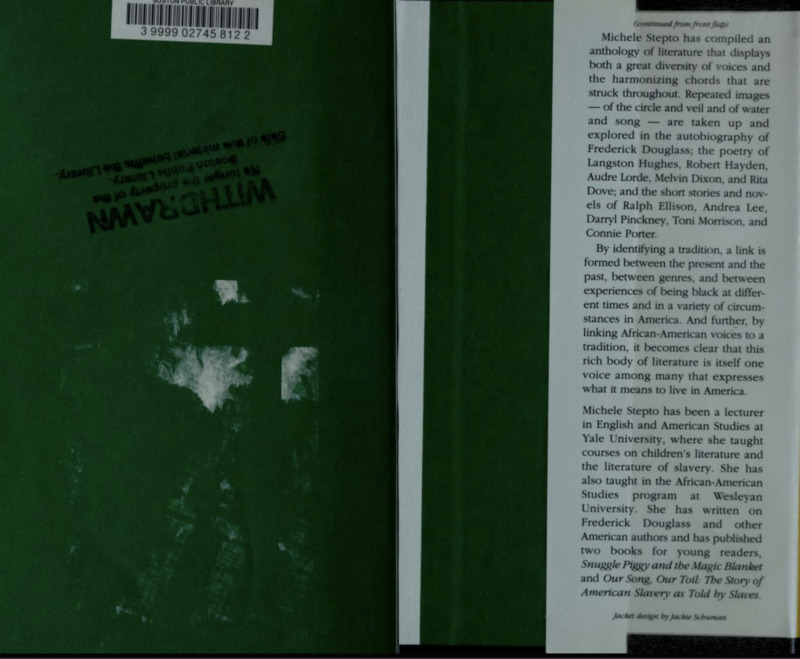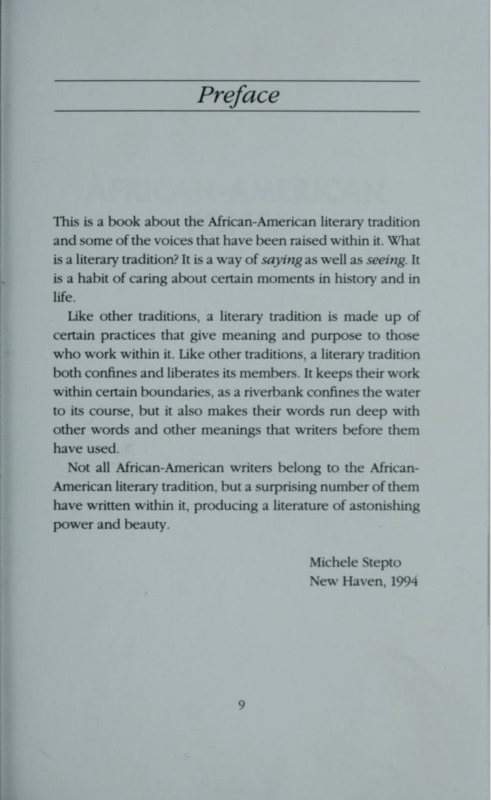African-American Voices (ed. Stepto)
Item
-
Title
-
African-American Voices (ed. Stepto)
-
This edition
-
"African-American Voices." Ed. Michele Stepto. Brookfield, CT: Millbrook Press, 1995. 160 pp.
-
Table of contents
-
Preface (9)
[Michele Stepto] / Introduction: Slavery, Culture, and the Beginnings of a Literature (13)
Part One: Circle and Veil (19)
The Sacred Circle: Geometry of Connections (21)
● Folktale / Bur Rabbit in Red Hill Churchyard (24)
● Frederick Douglass / "Narrative of the Life of Frederick Douglass, an American Slave, Written by Himself" [excerpt] (26)
● Harriet Jacobs / "Incidents in the Life of a Slave Girl" [excerpt] (28)
● Paul Laurence Dunbar / An Ante-Bellum Sermon (31)
● James Baldwin / Sonny's Blues [excerpt] (35)
● Toni Morrison / "Beloved" [excerpt: Baby Suggs in the Clearing] (37)
● Rita Dove / The Musician Talks About Process (39)
● Darryl Pinckney / "High Cotton" [excerpt: The Black Table] (41)
● Andrea Lee / "Sarah Phillips" [excerpt: New African] (42)
The Veil: W. E. B. Du Bois and the Geometry of Disunity (64)
● W. E. B. Du Bois / The Veil (66)
● Samuel Allen / A Moment Please (72)
● Ernest Gaines / "The Autobiography of Miss Jane Pittman" [excerpt: The Black Veil] (73)
● Charles Johnson / "Oxherding Tales" [excerpt: Horace Bannon, Soulcatcher] (75)
● Marilyn Wanick / Three Men in a Tent (80)
● Patricia Williams / "Alchemy of Race and Rights: Diary of a Law Professor" [excerpt] (84)
● Samuel Delaney / "Stars in My Pocket Like Grains of Sand" [excerpt: The Man in the Wire-Filament Mask] (86)
● Connie Porter / "All-Bright Court" [excerpt: Mikey's New School] (89)
● Jay Wright / Veil, I (93)
Part Two: Texts of Water, Songs of Exile (95)
The Text of Water, I: Middle Passage (101)
● Robert Hayden / "Middle Passage" [excerpt: The Sailor's Testimony] (101)
● John Edgar Wideman / Fever [excerpt] (103)
● Jamaica Kincaid / "Lucy" [excerpt: Leaving Home] (105)
● Calvin Forbes / Blue Monday (107)
● Michael Harper / The Drowning of the Facts of a Life (108)
● Derek Walcott / The Shell's Howl (114)
● Melvin Dixon / Grandmother: Crossing Dixon (116)
● Christopher Gilbert / This Bridge Across (117)
● Rita Dove / Thomas at the Wheel (119)
● Langston Hughes / The Negro Speaks of Rivers (120)
● Richard Wright / "Black Boy" [excerpt: Uncle Hoskins] (121)
The Text of Water, II: Deep River (116)
Songs of Exile (127)
● W. E. B. Du Bois / The Sorrow Songs [excerpt] (127)
● Sterling Brown / Ma Rainey (128)
● Gwendolyn Brooks / Paul Robeson (132)
● Audre Lorde / The Day They Eulogized Mahalia (133)
● Ralph Ellison / "Invisible Man" [excerpt: Peter Wheatstraw, the Blueprint Man] (135)
● Robert Hayden / Aunt Jemima of the Ocean Waves (142)
● Thylias Moss / Landscape with Saxophonist (147)
● Michael Harper / Reuben, Reuben (148)
Acknowledgments (149)
Some Books by These Authors (153)
Index (157)
-
List of illustrations: [not given in the volume itself]
Patrick Reason / Kneeling Slave (15)
Bill Traylor / Preaching with Circle (33)
Aaron Douglas / Aspects of Negro Life: From Slavery through Reconstruction (52-53)
Ronald Joseph / Tenement Window (1939) (69)
Lois Mailou Jones / Ubi Girl from Tai Region (1972) (76)
Aaron Douglas / Window Shopper (1930) (85)
Romare Bearden / The Sea Nymph (109)
John Biggers / The Cradle (112)
Robert Blackburn / People in a Boat (1939) (124)
Henry O. Tanner / The Banjo Lesson (1893) (130)
Romare Bearden / Blues at the Crossroads (137)
Claude Clark / Jivin' Scribe (1941) (144-45)
-
About the anthology
-
● Includes 37 items by 33 authors (including one folktale).
● This volume is designed for younger readers (7th grade and up), but it consists of excerpts from general African American writings, rather than writings for children. (Hence its inclusion in this project.)
● The work is something of a cross between a textbook and an anthology: the editor, Michele Stepto, offers an interpretive account of themes and images in African-American literature, an account illustrated with examples from literary works. These "examples" consists of poems and excerpts from prose works (fiction and non-fiction). Most of the examples are from post-WWII writings and all but one are from the 20th century.
-
Publisher's description
-
● Front jacket flap: "More than one hundred and fifty years before the American colonies fought for their independence in the Revolutionary War, the first slave ships arrived in Jamestown. As Africans bound in chains were herded off these so-called coffin ships onto American soil, the seeds of a new literature were sown.
"In the beginning, music, songs, stories, and poems spread by word of mouth. Few slaves knew how--or were allowed to learn--to read and write. Slavery was a deeply entrenched system in the United States for more than two hundred years. During that time, newly enslaved Africans brought with them across the Atlantic the literary traditions from a continent that, as the generations passed, fewer and fewer African Americans had ever seen.
"By the mid-eighteenth century, a written literature had emerged that combined African traditions wit distinctly American expressions of pain, protest, longing, and faith--the sounds of voices raised from within the condition of slavery.
"African-American literature is rooted in a community in exile and bondage. After the Civil War, blacks were at once freed from the confining circle of enslavement and thrust into the larger community of Americans, only to find that a new sense of displacement replaced the old. Black Americans continued to live apart, separated from others by what W. E. B. Du Bois first described as the veil of race." [continued on back flap]
-
Reviews and notices of anthology
-
● Kirkus Reviews (15 March 1995); online (20 May 2010).
"From the 'Writers of America' series, an anthology of about 40 short selections—poetry and excerpts from essays, novels, and short stories—by 31 writers, such as James Baldwin, Gwendolyn Brooks, Frederick Douglass, Rita Dove, W.E.B. DuBois, Ralph Ellison, Langston Hughes, Toni Morrison, Derek Walcott, and Richard Wright. Stepto's introductory matter and commentary link the selections thematically through images of the circle (representing the connectedness of life, family, and generations), the veil (of invisibility and separation), water (symbolizing variously the voyage to slavery and the journey to freedom or release in death), and music (the voice of an oppressed people). These give a sense of the overarching themes of African-American literature as a whole. A companion volume in the series, American Indian Voices (ISBN 1- 56294-382-0), is similarly arranged around the themes of belief, traditions, change, and survival. Although Stepto's volume is useful as an overview, and its thematic focus is a relief from the more conventional organization, the selections are mostly so brief that very little sense can be gained of the many distinctive voices represented. Artwork from painters such as Romare Bearden and Henry Tanner tie in with the themes, but reproduce poorly in black and white. (bibliography, index) (Anthology. 12+)." (full review)
-
Kirkus Reviews
-
Item Number
-
A0541

















